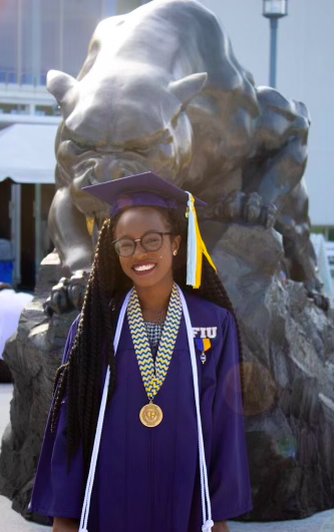
Each month, the Tutor Spotlight will feature a Sunshine Method tutor who has gone above and beyond to engage with and inspire students to reach their fullest potential. Read on to meet our change-makers!
Meet Asia!
Asia is a passionate and experienced tutor working towards her Masters Degree in Occupational Therapy at Florida International University. She loves Disney and if she could, she would live in Disney World. Asia works hard to ensure that every child she works with has the confidence to persevere when faced with academic and real life challenges.
Share a little bit about yourself, and describe what motivates you to tutor/mentor children in your community.
What motivates me to tutor and mentor the children I work with is that I recognize that not everybody has the same access to education. It is a law in the U.S. that all children must go to elementary school, middle school, and high school but despite that being a law, people still don't have equal access. I got the opportunity to work with students who had severe limitations and disabilities, children who are hospital bound and students with various types of personalities and I have loved getting to know all of them.
My favorite thing is being exposed to different kinds of kids. I’ve had challenging students, mild students, and very interesting students. I’ve gotten the opportunity, with The Sunshine Method, to interact with a variety of personalities.
How does the work you do with the Sunshine Method connect to your own personal values?
I have a strong belief that everybody deserves to have equal access to education. I have been lucky enough that teachers and professors have poured a lot into me, and I want to pay that forward by pouring that same energy and passion back into my students.
Describe the best session you have had with a child—your ‘Golden Teaching’ moment, if you will. What do you believe made it so successful?
It was recent and I'm still beaming about it because I loved how well it went. I'm currently working with a student who absolutely hates science and is not performing their best in science. I wanted to target this to turn their weakness into strength. Something that I always tell my students is "you're allowed to take a break, but you're not allowed to give up". My student fought against me for maybe 10 minutes going into the science lesson, but as I started teaching and tutoring, and reinforcing the concepts while breaking it down using methods and imagery that she relates to, by the end of the session she said, “Oh! I love science, now I want to learn more can we do it again next session!” That was probably one of the best sessions I had, being able to encourage my student to engage in something that she typically would avoid.
What kind of long-term progress have you seen your children make?
They can implement study skills that I’ve taught them. Most of the children that I work with have some sort of learning disability, cognitive delay, or developmental delay and so I've found that I can tutor a subject until I'm blue in the face but what sticks with them is the strategies that they can implement long term. I work with one student who has ADHD and so focusing on things that aren't interesting is difficult and they tend to avoid it. And so I sit with my student and work through different strategies that they could try and then they come back to me and say Miss Asia, “I was able to sit there for 10 minutes and pay attention to the teacher” is awesome. They went from 0 to 10 and so that's really what works long term is me helping them develop skills that they can then implement independent of me.
What role do you believe education plays in a child’s life?
I think of education as building blocks for everything else that a child will go through in life. As I said, my goal is for my students to no longer need me. If they can do it independently and have some sort of success, I call it a win. Education provides opportunities to socialize with peers that are like them and unlike them. It teaches some skills such, as perseverance, being willing to fall and get back up again. These are lifelong skills that they need to be successful later on in life when school is not a thing. I've also learned that education is more than just like sitting in a classroom or sitting in a tutoring session. Education is lifelong. We're continuously learning, whether it be in a school setting with somebody giving us information, or out in the real world experiencing different things with different people.
How has education changed your life?
Being able to understand difficult concepts and being able to apply different theories through education is how education has changed things for me. My understanding is that knowledge is power and that's also something that I tell my students. A lot of things in this world can be taken from us but your knowledge is not one of those things. I’ve learned from my kids as much as they’ve learned from me which is something that has changed my life.
What is something that you’ve had to overcome?
Oh, I have heard a lot of no’s. I think a lot of times it's very easy to hear no and think okay if I can't do that I'll give up and try something else. Specifically, with my grad school journey. I'm currently in school to earn a master’s in occupational therapy and the process to get into the program was hard enough, and then going through the program was an additional cherry on top. Everything has been difficult; from having my application getting lost, to calling day in and day out trying to figure out what's going on, to hearing no after no after no. This experience has helped me have hope because all you really need is one yes. It took my school saying yes and suddenly all that hard work just paid off.
I work with a lot of children who have different needs and I work with a lot of children that have a lot of difficulty conveying their wants and needs. That in and of itself I've had to not necessarily overcome with them because a disability can be long term, but I've had to overcome the feelings of ‘Oh my gosh I'm not a good enough tutor’ or ‘Oh my goodness I don't know what to do with my student today’. Not every session is going to be beautiful and it's not always going to go according to plan. My professors would say Asia, you need to have plans A through Z because you don't know what's going to happen.
What advice would you give a child that is struggling or having difficulty with a subject?
The advice that I would give them would be to persevere. So I'll express "Hey when I was in school, I struggled with subjects X,Y, and Z and here's what I did to help me". Specifically math was always difficult for me and so to watch my students go through it now and to have more of an outside perspective allows me to build connection and it helps them to realize that even the people that work with me aren't perfect either. It’s enabled my students to ask more questions in earlier sessions. Sometimes they say they don't have any questions and then I quiz them and I'm like alright we've got some work to do but when I share struggles in my own academic performance, then they feel safer to talk about what's going on. So the advice that I would give them is do not be afraid to ask questions. I don't think every educator is a good educator simply because sometimes they respond negatively to a child's question and it shuts down that curiosity but I always encourage them to ask questions or reassure that I'm not here to judge, I'm just here to assist.
What advice would you give a person that is interested in tutoring/mentoring with the Sunshine Method?
If you don't have a passion to actually help a child, it's probably not the position for you because a lot of children have different needs. You have to explain a concept three or four or five different ways before a child really connects with it so if you don't have patience and if you don't have passion, it's not going to work.
What are your hopes for your students in the future?
I hope the best for my students. I know they have a lot of potential and sometimes it's hard for me to unlock their potential if they don't want to. My hope is that they continue to be curious and continue to look towards the future and the possibilities of what they can do. I always try to reinforce in them that this may be where you're at now, but you don't know where you'll be in the next year or two years or three years. You could be flying across the moon because you're so successful! So I try to instill in them a positive outlook. I hope that they take the skills that they learn with me and that they implement them, and reap all the benefit from them.
Thank you for reading, and thank you Asia, for your contributions and impact on the next generation!



